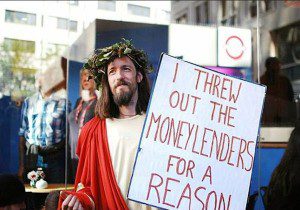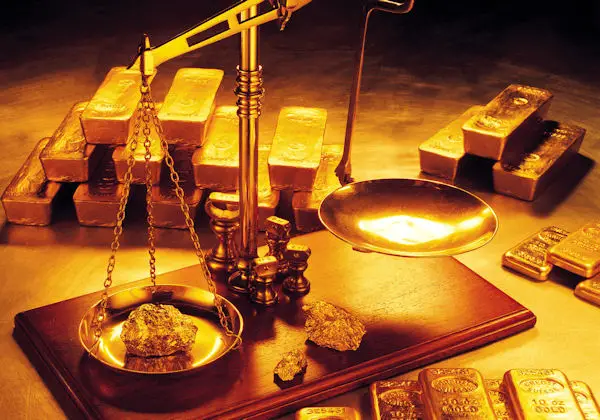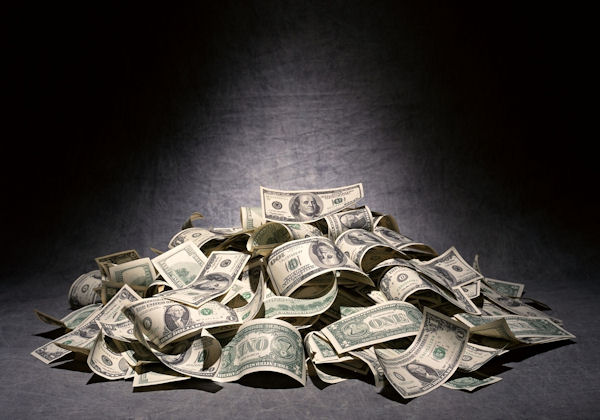24th October 2015
Guest Writer for Wake Up World
Money is a medium of exchange and the study of its use is called economics. In days gone by bartering was the order of the day. If you had corn and wanted wheat, and I had wheat and wanted corn, we would decide how much of one commodity was equivalent to the other and make an exchange on this basis. However, bartering is an awkward process because of the unwieldy items and commodities involved. Obviously, exchanges of goods would be facilitated if people used something less cumbersome as a medium of exchange such as gold or silver. If I grow wheat, by exchanging my wheat for gold it will allow me to obtain other things more conveniently when I want them. Thus metals like gold and silver became our first widely used mediums of exchange.
Once people started using gold and silver to trade goods, the need to transform these metals into standardized recognizable amounts became evident. This led to the development of rudimentary coins; whereby an authority would weigh out various quantities of these precious metals and stamp them as to purity and weight. Once this practice became common, it was only a matter of time before coins took on their characteristic disc shape and were impressed with a mint date and the likenesses of important officials. With the development of coinage, a person could exchange the fruits of their labor for coins and use them to obtain other things when convenient. During good times, some people ended up with more coins than they could use and this meant they needed a safe place to store them. This brought the goldsmith upon the scene!
Goldsmiths worked with precious metals and had safes or strongboxes within which they kept their supplies. Having this capability, it was only natural for people to take their excess coins to the goldsmith for safe keeping. Upon so doing, the goldsmith would give them a written receipt for the amount of coins being stored. Soon people realized that instead of trading coins for the things they needed, they could trade the receipts instead. Thus paper currency was born and this freed people from carrying bulky coins when they went to market.
This rudimentary monetary system worked well in small agrarian economies, but as villages turned into towns and towns into cities, a need to borrow money developed and who was better positioned to loan money than the goldsmith. Not only did he have his own money, but he also held other people’s money which was sitting in his coffers doing nothing. Of course, if the goldsmith was going to loan other people’s money, he needed to share some of the interest earned with them. This was the start of what we know of as modern banking. The goldsmiths were our first bankers. People would entrust their money to the banker/goldsmith and instead of paying him for this service, he would pay them a share of the interest he earned from loaning their money to other people. From the depositor’s and borrower’s perspective, this made sense and appears reasonable. However, appearances can be deceiving and how deceiving will soon become apparent.
If people were going to borrow money from a goldsmith, for obvious reasons it would be far more convenient if the loan was made in paper currency instead of coins. However, the demand notes presently in circulation were for all the coins held by the goldsmith. How could the goldsmith issue multiple demand notes on the same number of coins? The goldsmith knew that it was a rare occurrence when someone retrieved the coins they had on deposit. This being the case, if the goldsmith issued demand notes for more coins than he had, from a practical point of view, the chances were that he would always have sufficient money on hand to cover the notes that were redeemed by any one or even several of his depositors. Understanding this, our enterprising goldsmith went out on the limb and adopted this practice. Upon so doing, fractional banking was born.
The use of fractional banking by private bankers, although morally questionable, was a boon to society because it allowed and facilitated the loaning of money. This, as a matter of course, fueled development of our modern industrialized society. However, every blessing has a downside and as things are, the downside to private fractional banking is significant and far reaching. How terrible and far reaching it is, is a well-kept secret by the banking industry. As a result, very few people understand how fractional banking really works or how deplorable the downside to its use is.
When a person deposits gold with a goldsmith, he is given a demand note that can be traded as if it were the metal deposited. However, when the goldsmith issues a piece of paper to a borrower that can be traded in this same manner, the gold backing the note does not really exist. Instead of holding gold to back the currency being loaned, the goldsmith only has a promise from the borrower to not only deposit the gold being borrowed at some time in the future, but also, incredibly, to allow the goldsmith to keep this gold or silver as his own.
A depositor is given a demand note for his gold that can be used in trade. End of story! A borrower is given a demand note that he can use in the same way as a depositor. However, this is not the end of the story because now the borrower is obligated to earn an equivalent amount of gold not for himself, but for the banker who loaned him nothing.
STOP! Think about what you just read and read it a few more times so it will sink in…
When someone borrows money from a bank, the bank is not loaning the borrower anything. Instead, all the bank does is make a bookkeeping entry in the borrower’s account for the amount borrowed and this costs nothing other than the ink the bank used to make the entry. The bookkeeping entry has value only because those involved think it does and despite this sleight of hand, the borrower is obligated to give bank, in real money, the original amount borrowed plus interest. After all is said and done, the net result of this transaction is that the borrower, in real value, gets the amount he borrowed less interest and the bank gets, in real value, the amount borrowed plus interest. This is absurd!
Why should anyone be able to reap huge amounts of profit from other people for doing virtually nothing? No one should and this is why usury was considered a crime in most early societies. The problem evident is that the money paid to the bank over and above interest is windfall profit and as such should be surrendered to a third party or some other controlling authority. The interest earned alone is sufficient compensation for the banks’ issuance and servicing of a loan, so this is all they should be allowed to keep. No private individual or institution should have the right to keep money they create out of thin air by establishing credit. Only society as whole in the form of government should reap this benefit. This is why our Founding Fathers ensured that our Constitution mandated that Congress and only Congress will have the right to coin or create money. They knew and understood that such great power and its associated misplaced wealth, was a grave and serious danger to the newly created Republic.
Money is power and what greater power is there than to be able to create wealth with the flick of a pen? And what can be said of men, who by a twist of fate would wield such power. First of all, they would become wealthy beyond what anyone could ever imagine and they would use this wealth to hold sway over governments and the other institutions of society. To be sure, our goldsmith turned banker ended up bankrolling the world within which we live, but unbeknownst to most, because of the tremendous wealth they acquired, they also became behind-the-scenes power brokers who pulled the strings that made the rest of us dance. People think of the history of the world as the interplay and clash of nations, but the real history of our world was orchestrated by banking cartels in pursuit of wealth and power. You will never read this in a textbook because bankers operate in secret behind closed doors and nothing they do in this regard is documented.
Granted, bankers provide a needed and important service to society. We all know this, but there is one very important question that never gets asked or addressed. Is the price paid by society for their services worth it? The answer to this question is a resounding no. When bankers control credit and reap the excess wealth it invariably creates, they have an unfair advantage over rest of society. Everyone else works for their money! Why should bankers make huge amounts of money by default simply because they are the ones who issue credit? Money is power and the more power any one group of individuals have, the more they will use it to protect their rice bowl at the expense of the citizens they are supposed to serve. However, our situation is far worse than this because of the huge amounts of windfall profits involved. Fractional banking, in the hands of private interests without governmental moderation and oversight, turns citizens into being the economic slaves of the bankers. Furthermore, it also ensures that a majority of the wealth of a nation, created by the enterprise and hard work of its citizens, will end up in the hands of the bankers.
The United States started out as the thirteen colonies of Great Britain. Most Americans think that our revolutionary war was fought to separate us from the tyranny of the Crown. However, our revolutionary war was more than this. It was also fought to keep the private central bank that controlled England at the time from controlling us. The Founders stood against tyranny and this meant both tyranny of government and tyranny of a corrupt monetary system.
The Revolutionary War freed America from England and the international bankers who controlled Europe. When the war was over, England fled our shores in defeat, but the international bankers were relentless and never gave up. In 1913 they finally triumphed when Congress was cajoled and bribed into passing the Federal Reserve Act, which, in gross and flagrant violation of our constitution, turned the monetary system of this nation over to a secretive and private corporation owned and controlled by the world’s richest men. The question that begs to be answered is why would Congress do such a thing?
Surely, in light of what we now know, this ignoble and despicable act was not only not in our best interest, but resulted in destruction of the Republic, which our forebears sacrificed so much to create. Why would a member of Congress vote for a monetary system that resulted in our undoing and turned citizens into economic slaves? The possible answers to this question are obvious. Either the supporting Congressmen were duped or they were back-stabbing traitors who voted against our best interests to further their own.
Think about what this has cost the citizens of this nation. If in 1913 the members of Congress did their jobs properly and honored their sacred oath of office, this nation would still be a Republic. Furthermore, with Congress coining our money and regulating its value, there would be no need for an income tax. Governments at all levels would be able to fund everything they do solely out of the wealth realized from establishing credit and loaning money. Taxes would be eliminated and once again Americans would be able to enjoy all the fruits of their labor. Recessions and depressions would be eliminated and only one member of a household would have to work. People would be able to save money and consumer credit would be almost non-existent. The work week and work day would be shorter than they are today and people would be able to take extended vacations. They would also be able to retire earlier in life. All of this would be the status quo for Americans if it were not for the fact that, in 1913, Congress sold us into bondage. Hasn’t the time come for Congress to rectify their ignoble and horrible mistake?
Where does this leave us? This nation, having been drained of its wealth and vitality, is being dissolved in keeping with the designs of the bankers who established the New World Order. They believe the time is ripe to establish themselves as the recognized rulers of the world. Think not! Then read the words of David Rockefeller, the New World Order traitor-in-residence, spoken to the Trilateral Commission in 1991:
Source Article from http://wakeup-world.com/2015/10/24/the-trap-of-debt-economics/
Related posts:
Views: 0
 RSS Feed
RSS Feed

















 October 23rd, 2015
October 23rd, 2015  Awake Goy
Awake Goy 


 Posted in
Posted in  Tags:
Tags: 
















